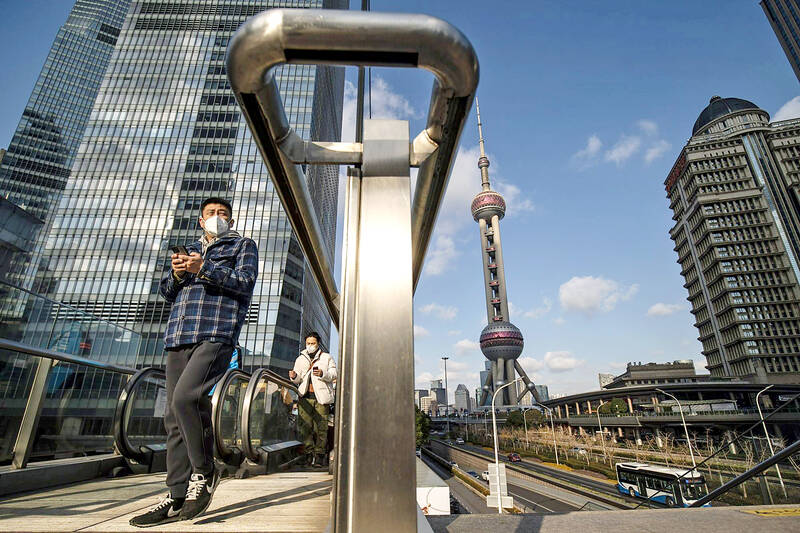China’s economy ended the year in a major slump as business and consumer spending plunged last month, with more disruption likely in the first few months of the year as COVID-19 cases surge across the country.
Official data over the weekend showed that the decline in manufacturing worsened last month, while activity in the services sector plunged the most since February 2020.
Separately, a private survey of businesses by China Beige Book International on Monday said the economy likely posted an annual contraction in the fourth quarter of last year.

Photo: Bloomberg
China’s ditching of strict COVID-19 controls last month fueled a surge in infections in major cities, prompting people to stay home as they fell ill or feared becoming infected.
While the outbreak has likely peaked in places such as Beijing, and economic activity is starting to rebound there, the virus is spreading fast across the country. A likely travel rush during the Lunar New Year holiday later this month could see cases spread to rural areas, disrupting activity in the first quarter of this year.
A private purchasing managers’ index survey yesterday confirmed the worsening decline last month.
The Caixin manufacturing index — which covers mainly smaller, export-oriented businesses — dropped to 49 from 49.4 in November.
However, businesses were optimistic about the future, with confidence in the 12-month outlook climbing to a 10-month high.
“China’s growth prospects have been improving with the reopening accelerating,” said Zhou Hao (周浩), chief economist at Guotai Junan International Holdings Co (國泰君安國際控股). “Overall, the darkest hour is gone.”
Economists expect a faster rebound once the infection wave peaks, with growth forecast to accelerate to 4.8 percent this year from an estimated 3 percent last year.
Still, the recovery is likely to be bumpy, and economic activity remains well below pre-COVID-19 levels.
Travel was relatively muted over the three-day New Year holiday.
The number of trips made was little changed from a year earlier, while tourism revenue was up 4 percent from the same period last year, the Chinese Ministry of Culture and Tourism said.
Tourism revenue was just 35.1 percent of the levels reached in 2019, while the number of trips were 42.8 percent.
China Beige Book, a provider of independent data, said its surveys found that the economy likely grew only 2 percent last year.
“With the ongoing COVID tidal wave, investment sliding to a 10-quarter low and new orders continuing to get battered, a meaningful first-quarter recovery is increasingly unrealistic,” China Beige Book chief economist Derek Scissors said.
Policymakers have pledged more fiscal and monetary support to aid the economy’s recovery this year. The Ministry of Finance last week said that fiscal spending would be expanded “appropriately” with the use of policy tools such as the budget deficit.
The central bank also vowed to support domestic demand and maintain credit growth.
China is likely to cut interest rates and the reserve requirement ratio for banks in the first half of the year, while raising the fiscal deficit ratio for this year, a survey of economists published yesterday in state media found.

Taiwanese suppliers to Taiwan Semiconductor Manufacturing Co. (TSMC, 台積電) are expected to follow the contract chipmaker’s step to invest in the US, but their relocation may be seven to eight years away, Minister of Economic Affairs J.W. Kuo (郭智輝) said yesterday. When asked by opposition Chinese Nationalist Party (KMT) Legislator Niu Hsu-ting (牛煦庭) in the legislature about growing concerns that TSMC’s huge investments in the US will prompt its suppliers to follow suit, Kuo said based on the chipmaker’s current limited production volume, it is unlikely to lead its supply chain to go there for now. “Unless TSMC completes its planned six

Intel Corp has named Tasha Chuang (莊蓓瑜) to lead Intel Taiwan in a bid to reinforce relations between the company and its Taiwanese partners. The appointment of Chuang as general manager for Intel Taiwan takes effect on Thursday, the firm said in a statement yesterday. Chuang is to lead her team in Taiwan to pursue product development and sales growth in an effort to reinforce the company’s ties with its partners and clients, Intel said. Chuang was previously in charge of managing Intel’s ties with leading Taiwanese PC brand Asustek Computer Inc (華碩), which included helping Asustek strengthen its global businesses, the company

Power supply and electronic components maker Delta Electronics Inc (台達電) yesterday said second-quarter revenue is expected to surpass the first quarter, which rose 30 percent year-on-year to NT$118.92 billion (US$3.71 billion). Revenue this quarter is likely to grow, as US clients have front-loaded orders ahead of US President Donald Trump’s planned tariffs on Taiwanese goods, Delta chairman Ping Cheng (鄭平) said at an earnings conference in Taipei, referring to the 90-day pause in tariff implementation Trump announced on April 9. While situations in the third and fourth quarters remain unclear, “We will not halt our long-term deployments and do not plan to

The New Taiwan dollar and Taiwanese stocks surged on signs that trade tensions between the world’s top two economies might start easing and as US tech earnings boosted the outlook of the nation’s semiconductor exports. The NT dollar strengthened as much as 3.8 percent versus the US dollar to 30.815, the biggest intraday gain since January 2011, closing at NT$31.064. The benchmark TAIEX jumped 2.73 percent to outperform the region’s equity gauges. Outlook for global trade improved after China said it is assessing possible trade talks with the US, providing a boost for the nation’s currency and shares. As the NT dollar